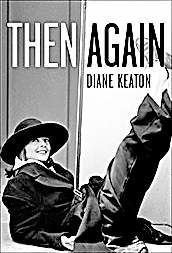Keaton’s collage a touching autobiography of 2 women
Published 4:00 am Sunday, November 20, 2011

- Keaton's collage a touching autobiography of 2 women
“Then Again” by Diane Keaton (Random House, 265 pgs., $26)
Diane Keaton’s book about her life is not a straight-up, chronological memoir. It’s a collage that mixes Keaton’s words with those of her mother, Dorothy Deanne Keaton Hall, who died in 2008. Since Hall left behind 85 scrapbooklike journals, a huge and chaotic legacy, there is every reason to expect that Keaton’s braiding of her own story with her mother’s in “Then Again” will be a rambling effort at best.
Instead it is a far-reaching, heartbreaking, absolutely lucid book about mothers, daughters, childhood, aging, mortality, joyfulness, love, work and the search for self-knowledge.
The collage format works so well for Keaton that she can easily weave her love affairs with three very famous film luminaries into the larger tapestry of her life with family and friends.
Not many lives would lend themselves to this kind of autobiographical treatment. But Keaton’s timing is so different from her mother’s that the contrasts between their lives are full of drama. “At 63, I’m doing what Dorothy did when she was 24,” writes Keaton, who adopted the first of her two children when she was 50. Dorothy was a young housewife when she raised Diane and her three younger siblings. And when they left home, they left her at a loss, and the journal writing began.
“At 54, Dorothy was put out to pasture with 32 more years of living staring her in the face,” Keaton writes. “At 65 there is no pasture, and I’m not lonely.” Keaton, the la-de-da loner for so much of her life, now finds herself thrust “out of a life of isolation into a kind of family-of-man scenario, complete with an extended family, new friends and much needed ordinary activities.” Her mother never had the option of a third-act rescue.
It is terrifically poignant to learn that Keaton, whose public personality was that of someone so charmingly addled, had to deal so seriously with her mother’s mounting confusion. At 63, already frightened by the prospect of memory loss, Dorothy wrote a long journal entry specifying her children’s birthdays, her license plate number and her brand of hair conditioner, just so that she could hang onto those things.
Having watched her father die of a brain tumor and her mother fade into an Alzheimer’s fog, Keaton worries about her own future and asks, “When does ‘Where did I put my keys?’ become a diagnosis?” She is realistically fearful. But the delight she takes in her son and daughter helps her keep those demons at bay.
“Then Again” includes Dorothy’s response to an “Annie Hall” screening, and her pride in her daughter’s success. It also points out that Keaton was involved with Warren Beatty when the film came out, and contrasts his way of wooing her with Allen’s. Allen adored and babied her. Beatty could be brusque. But he could also wow her with wild acts of generosity that played right into her Daddy issues. Still, she says, “I wanted to be Warren Beatty, not love him.”
Between its many glimpses of Keaton at different ages, its telling of Dorothy’s story and its loving portrait of Dexter, Keaton’s teenage daughter, this book manages to present the full spectrum of women’s experiences, from babyhood to adolescence, youthful insecurity to liberating adulthood to slow, lingering death. Its power as a collage has been greatly enhanced by tight, punchy editing of the fragments that Keaton variously writes or excerpts. Some of its stories are universal and painful, yet this book is not mired in melancholy. Instead it’s inspiring in its empathy, wisdom and self-knowledge.




